Pharmacies celebrated at Independent Pharmacy Awards in the House of Commons
In News
Follow this topic
Bookmark
Record learning outcomes
The ways independent pharmacists and their teams improve the health of their local communities across the UK was celebrated yesterday at the Independent Pharmacy Awards.
The House of Commons was again the setting for the annual event which drew leading figures from the pharmacy sector, MPs and pharmaceutical executives.
There were six categories in all. Ladywell Pharmacy in London beat off stiff competition from Totty Pharmacy, also in London, and Kinwell Pharmacy in the Scottish Highlands to win the Pharmacy Innovation award.
Ladywell Pharmacy caught the judges’ eyes with their pioneering multimorbidity kidney point-of-care clinic, which they designed and deliver to patients.
The clinic targets patients with proteinuric chronic kidney disease, who are at increased risk of cardiovascular complications and renal decline. Using Siemens EPOC machines, our winner and his team conduct immediate blood analysis to guide same-day prescribing decisions.
The clinic was created in response to high chronic kidney disease prevalence and multimorbidity in their area.
Community Pharmacy Hertfordshire (CPH) were crowned Best Supporting Local Representative Group in a category that also contained Community Pharmacy Leicestershire and Rutland and Community Pharmacy Greater Manchester.
The judges were impressed with CPH’s communications strategy and the effective way they engage with their contractor base through weekly newsletters, targeted WhatsApp groups and strategic social media growth.
CPH has delivered critical tools such as cost calculators, training and referral support which led to a rise in NHS 111 referrals and the successful rollout of Pharmacy First.
A standout achievement is CPH’s ‘Empowering Integrated Community Pharmacy’ pilot. By introducing 32 community pharmacy engagement leads, GPs’ knowledge of pharmacy services has improved and GP-to-pharmacy referrals have increased.
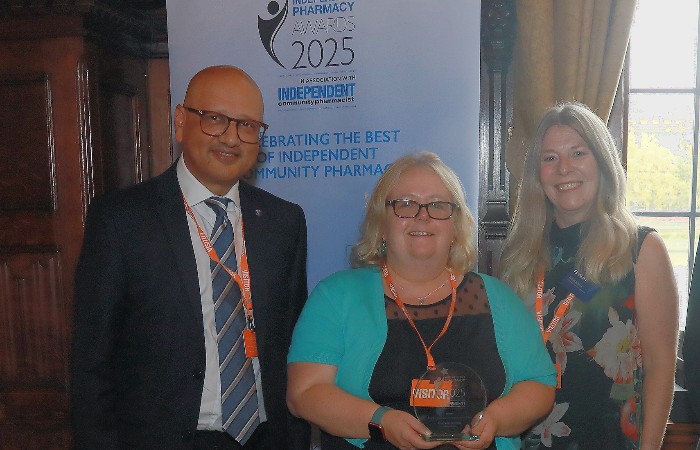
Pharmacy Team of the Year were Newgate Lane Pharmacy in Mansfield. They beat Star Pharmacy in London and Wellswood Pharmacy in Hertfordshire to the award.
There are many examples illustrating how Newgate Lane Pharmacy goes the extra mile for their patients. One example which stands out is the team’s methadone dispensing service, which provides a vital lifeline for patients recovering from opioid dependency. It supports 70 patients every day.
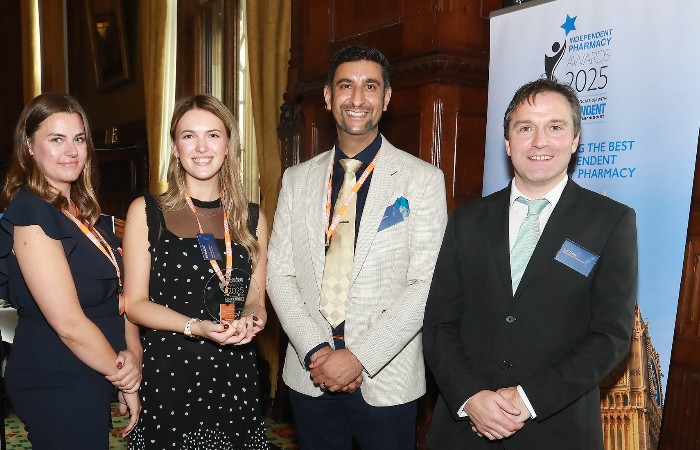
Alice Clapham and Hannah Sleeth from Newgate Lane Pharmacy, with Cyrus Hodivala, managing director of Meditech, the sponsors of the award, and Independent Community Pharmacist editor Neil Trainis.
Pharmacy Technician of the Year was Sharon Lucas, who works at Rainbow Pharmacy in Ipswich. She beat Fiona Downing from Pinhoe Pharmacy in Exeter and Megan Archibald from Kingsley Muti Pharmacy Isle of Man to win the award.
Sharon is trained in ear microsuction and hypertension monitoring and diagnoses patients with high blood pressure, referring them to GPs for life-changing treatment.
Her ear microsuction service has enabled patients to regain their hearing and proceed with NHS hearing aid referrals. She also mentors staff and writes SOPs, assists with MHRA alert management and supports the pharmacy quality scheme alongside the pharmacist.
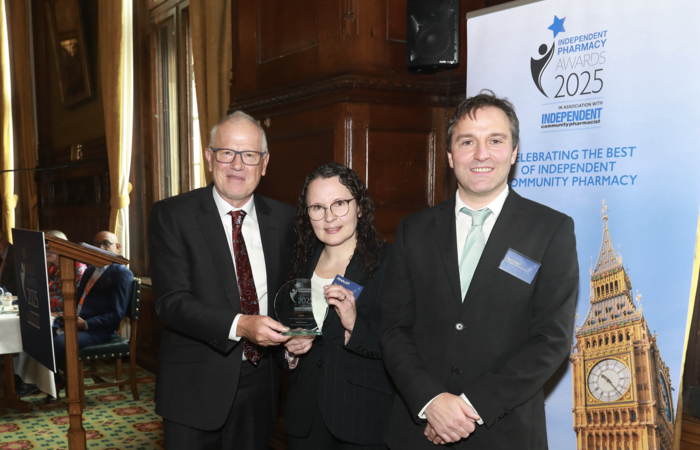
Sharon Lucas is flanked by Matthew Caldwell-Nichols (left), the CEO of Precision Marketing Group, the sponsors of the award, and Independent Community Pharmacist editor Neil Trainis.
Independent Prescriber of the Year was Kiran Raja from Dean & Smedley in Littleover. She beat Muhammad Zaheer from Shelley’s Pharmacy in Birmingham and Roger Compton from XO Clinic in Wakefield.
Kiran’s original prescribing speciality was hypertension but she quickly upskilled in anticoagulation therapy and now provides a weekly one-stop INR clinic, where patients receive on-the-spot testing, immediate dosing instructions and follow-up scheduling.
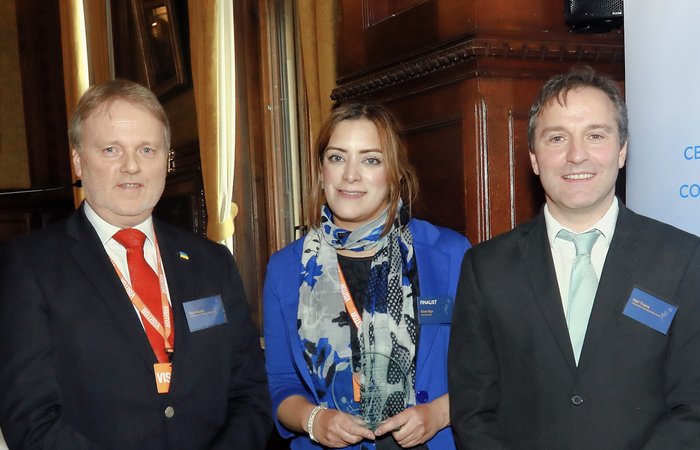
Kiran Raja (centre) is flanked by Pharmacists’ Defence Association chairman Mark Koziol (left) and Independent Community Pharmacist editor Neil Trainis.
Gareth Hughes at Tynewydd Pharmacy in Rhondda Valley was Independent Pharmacist of the Year after seeing off some very tough competition from Zaheer and Anna Matthews at Nanty Pharmacy in Maesteg.
The judges were impressed by Gareth’s strong ties with local GPs, practice pharmacists and other local health providers. His pharmacy pilots urinary tract infection pathology testing, offering patients seamless triage, diagnostics and follow-up care.
One of his standout achievements involved a patient with pyelonephritis. They initiated diagnostics, co-ordinated with microbiology to confirm resistance, liaised with the GP and ensured full recovery through collaborative follow-up.
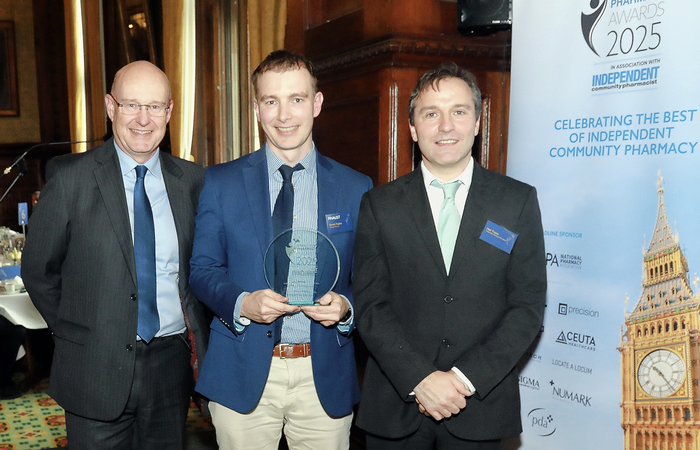
Labour MP: Pharmacy has often been overlooked in policy discussions
The awards were hosted by the Labour MP and former pharmacist Sadik Al-Hassan, who paid tribute to independent pharmacy’s ability to reach people in their local communities.
“Independent pharmacies, in particular, offer something unique – continuity of care, local knowledge and genuine personal relationships,” he said.
“You know your patients by name. You understand the specific health challenges facing your communities. You adapt your services to meet local needs, whether that's offering home deliveries to housebound patients, providing specialist advice on chronic conditions, or simply being a trusted presence on the high street.”
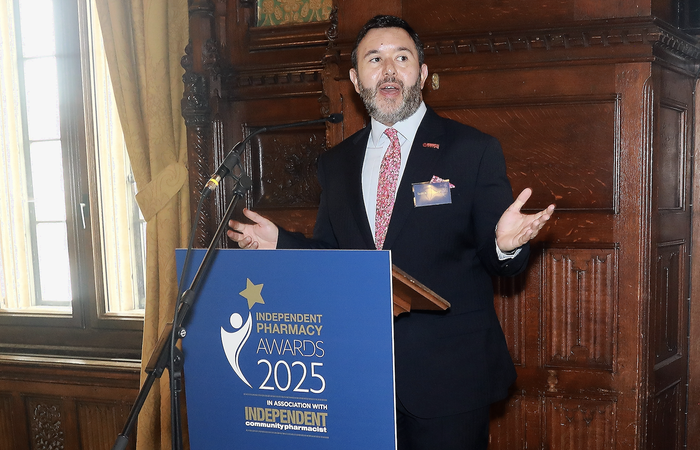
However, he said community pharmacy had “for too long been the unsung hero of the NHS, always there yet often overlooked in policy discussions and funding decisions”.
Insisting he was “passionate about ensuring the sector gets the recognition it truly deserves”, he said: “As we move further towards community-first healthcare, independent pharmacies are not just important, but indispensable.”
He insisted Labour’s “vision for a truly integrated, neighbourhood-based health service” through its 10-year NHS plan “simply cannot succeed” without independent pharmacies.
“When we talk about easing pressure on GP surgeries and A&E departments, we're talking about empowering pharmacies to do more of what they already do brilliantly,” he said.
“When we discuss preventative healthcare and early intervention, pharmacists are on the frontline, catching problems before they escalate.
“When we consider health equity and access, independent pharmacies are often the only healthcare provider in rural villages and underserved communities.”
Scotland’s ChPO comes up with six-point plan
The awards also heard from the chief pharmaceutical officer for Scotland Alison Strath, who said its Government’s approach to health services was underpinned by five principles: prevention; care designed around people not systems or services; an emphasis on community-based care over hospitals; the delivery of digital; and planning for the entire population, “not along existing boundaries”.
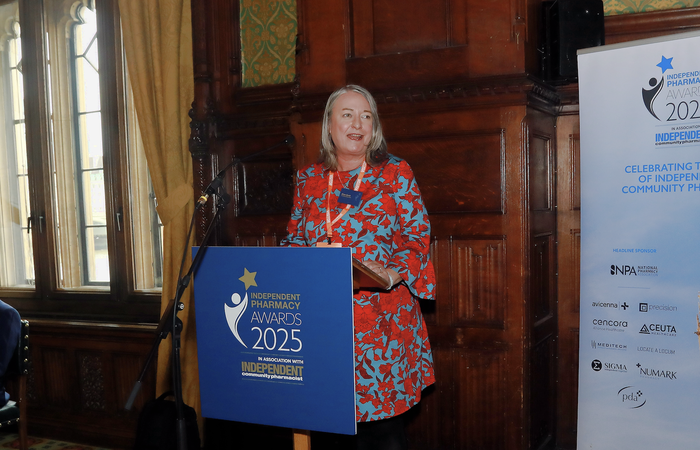
She came up with her own “six-point pharmacy plan,” which she insisted could “be applied regardless of UK nation”. Her six Ps were "place" – backed up by evidence that community pharmacies are accessible to the public.
Next, was population health and prevention – Strath said community pharmacy was “in a prime position to embed prevention approaches, to help actively tackle health inequalities and improve the health of our nations by providing a range of prevention interventions and supporting the early detection of disease”.
Point three was prescribing and she insisted pharmacy prescribers needed to “assure the public, patients and other healthcare professionals of their competence to prescribe and be able to evidence that”.
“We would be wise to address this now, rather than later,’’ she said. Point four was productivity and she insisted digital transformation was “central to underpinning the developing role of community pharmacy teams”.
“In Scotland, we are a little behind the rest of the UK on that front but we are looking to catch up with the development and implementation of a digital prescribing and dispensing pathway,” she said, adding artificial intelligence could “further streamline how community pharmacy delivers services”.
Point five – pharmacogenomics and pharmacovigilence – were “the prime domain of pharmacists,’’ she insisted.
“Aligning our expertise in medicines with how people’s genetics influence drug response. Who else is better placed to leading this?’’ she said.
On her final point, perseverance, Strath said: “If I have learnt one thing from my time working in the Scottish Government, it is that systematically embedding change takes time.
“Thomas Edison said ‘our weakness lies in giving up and that the most certain way to success is to always try just one more time.’”
NPA chief: It is really important we reform the pharmacy contract
The National Pharmacy Association chief executive Henry Gregg told the awards he has been spending two days a week visiting pharmacies across the UK since he started in the role four months ago.
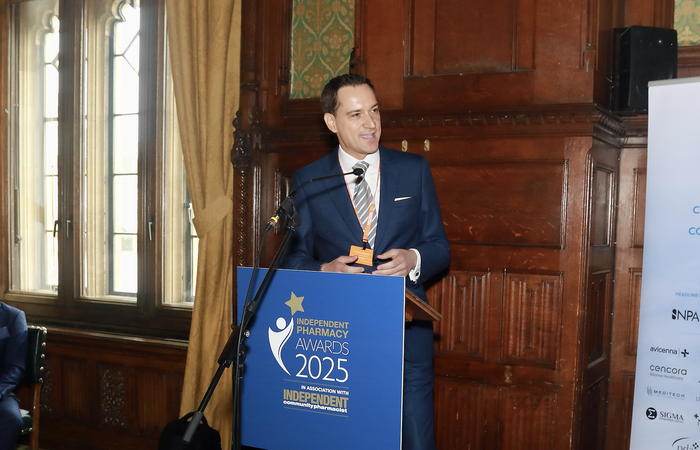
“I’ve been to Edinburgh twice, Belfast twice, Cardiff, Manchester, Leeds, Tooting, Birmingham, Uckfield – all visiting members and I absolutely love it. It is the favourite part of my job,” he said.
“That’s partly because I get to listen to community pharmacists about their experiences, their challenges and opportunities are and how we can support them as the NPA.”
However, Gregg warned pharmacists have told him they are struggling to pay their wholesaler bills and some “have not taken a salary for years or they have had to remortgage their house, draw down their pension or take out loans”.
He called on Labour to close the £2.6 billion funding gap as soon as possible. “Without the right funding for the dispensing side, how can a pharmacy invest in a consultation room or a robot if they don’t know what their income will be in three months how can they pay back the loan?” he said.
“It gives me mixed feelings every time when I see such potential in community pharmacy held back by financial restraints.
“So, it is really important that we reform the contract and make clear we need proper investment for dispensing as the platform to then fully fund new services.”
